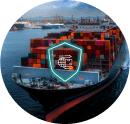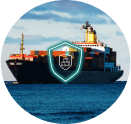Marine Insurance
Marine Insurance
All insurance is designed to manage risks in the event of mishaps like accidents, damage to property and the environment, or loss of life. When it comes to ships, the stakes are a little too high, as all factors are involved in the operation, like the high risk of losing valuable cargo or expansive ships, the risk of damage to the environment due to oil spillage, and the risk of losing seafarers’ lives.
Even when parties ship goods via sea/ocean, they require marine insurance for many of their import-export trade proceedings. Because goods in transit need to be insured.
Read on to learn all about marine insurance.
What is Marine Insurance?
A marine insurance policy is used to cover all watercraft, such as hulls, cargo, and liability related to various maritime activities involving the transportation of goods by water; it is also used to cover ships and more. Marine insurance provides protection against damage that occurs from the point of origin to the destination. Watercraft eligible for this policy include cruise ships, pleasure yachts, large container ships, tugboats, and more. Marine insurance also provides protection against oil spills at sea.
All of this makes marine insurance very important for companies based on land and even mandatory for all ship and boat owners who use their watercraft for commercial purposes/transportation.
Types of Marine Insurance
Different types of marine insurance policies are designed to satisfy different needs of the customer. A few common types of marine insurance are:

Export and import insurance policies protect businesses that deal with international trade against the risks associated with exporting and importing goods. With export and import insurance, one will be covered against all loss/damage to goods during transit.

The hull insurance covers the torso and hull of the vessel, along with all the articles and pieces of furniture on the ship. It is usually taken by the owner to avoid the loss of the ship from mishaps

Inland transit insurance offers coverage against loss/damage of cargo or goods during transportation between points of origin and the final destination. It primarily covers damage caused by fire, explosions, hijacks, accidents, or overturnings.

Specific transit insurance is a goods in transit insurance plan that offers protection to any consignment for a single trip. Since it is specific, the protection will cease once the cargo reaches its destination.
Why Do You Need Marine Insurance?
With marine insurance, you can reduce your exposure to risk in case of loss or damage to your goods or assets while in transit.
Being in the import and export business, you may have implanted your vessels with AIS transponders, GPS navigation receivers, echo sounders, and weather radars. Nonetheless, as the shipping lanes get busier due to increasing trade volumes, the scope for accidents has also increased in recent times.
In the case of marine disasters like oil spills, you can face penalties, the costs of which can be prohibitive. Such legal expenses can have a big impact on your business. Marine insurance can help you manage these risks and improve the resilience of your business.
With an all-inclusive marine insurance plan, your fleet of commercial vessels can function without any discernment. It will help you control risks arising from damage to or loss of valuable cargo worth crores of rupees.
Thus, investing in marine insurance is considered essential to reduce the potential risks and also ensures the continuity of the company’s value chain.
Features and Benefits of Marine Insurance
Here are the features of marine insurance that you need to know before buying:
- Comprehensive All-Risk Coverage
Marine insurance policies offer comprehensive coverage against potential marine-related risks to which goods are exposed while they are in transit.
- Customization
Marine insurance plans can be easily customized to meet the needs of the customer. - Coverage Extension
With marine insurance, one will have the freedom to expand their coverage with some add-on benefits to get protection against strikes, riots, etc. - Flexibility
Marine insurance plans are considered flexible as they have several options to cater to all insurance requirements within their budget.
Clauses Under Marine Insurance
There are two main marine insurance clauses. They are as follows:
- Inland Transit Clauses (ITC)
The inland transit clause is for inland transit in India only. It can be classified as ITC-A or ITC-B. The ITC-A covers all damage except rainwater damage, and the ITC-B covers only accidental damage. - International Cargo Clauses (ICC)
The ICC, or International Cargo Clause, is for international cargo only. Similar to ITC, it is also classified as ICC-A or ICC-B. ICC-A covers all the damage except rainwater damage, and ICC-B covers accidental damage only.
What Does Marine Insurance Cover?
The risks covered under the marine insurance policy are listed below:
- Risks Clause
Within a risk clause, the insured cargo that is being transported is protected against all risks that can lead to the loss or damage of the cargo. - Clause of Both to Blame Collision
Both to blame collision clause states that both ship owners must share the responsibility for a loss/damage to the cargo if anything occurs due to the negligence of both parties. - Clause of General Average
The general average clause in marine insurance obliges the insurer to share the cost of losses incurred voluntarily to save the voyage from complete destruction.
What is Not Covered Under Marine Insurance?
Some of the exclusions under marine insurance are mentioned below:
“Any willful misconduct that damages insured property will not be covered under this policy,” the statement said.
- Expenses incurred for everyday wear and tear or ordinary weight loss/volume or leakage are not covered.
- Damage caused by insufficient packing or preparation of the subject matter insured to withstand ordinary incidents during transit.
- Loss occurred because of the delay in the shipment.
- Any damage caused by the inherent vice or nature of the subject-matter insured.
- The policy will not cover damage/loss caused by people taking part in labor disturbances, riots, or civil commotions.
- Damage occurring directly or indirectly caused by or arising from the use of any weapon or device employing atomic or nuclear fission will not be covered.
- The policy will not cover any expenses incurred due to damage caused by the unseaworthiness of the ship.
- Damage caused by insolvency or financial default by the owner, manager, or operator of the vessel, and the person being aware that such insolvency could prevent routine prosecution.
How To File a Claim Under Marine Insurance?
It’s important to know the process for raising the claim, once you’ve gotten your insurance. Here are the steps to follow while filing a claim under marine insurance:
- First, the insured has to inform the insurer about the loss or damage.
- In case of a missing package, the policyholder has to file a police report.
- The insurance provider will send a surveyor to visit the site for the detailed survey.
- if all the documents and claims are found to be true, the claim will be settled.
Documents Required:
- Copy of insurance policy documents
- The survey report
- Copy of billing landing
- Claim bill
- Original invoice list
- A copy of letters exchanged
To Sum Up!
Marine insurance is a niche that involves a lot of thought, straightforwardness, and complex dealings in order to achieve common grounds of payment and receiving.
But as complex as the field is, it caters to a lot of people and offers a wide range of services and policies to facilitate uncomplicated business transactions.
Therefore, for the safety of business and money, it is advised to have the right kind of marine insurance. The insurance will resolve problems not just in the short run, but also in the long run as well.
If you are looking for marine insurance, Policy Wings will help you get the right insurance customized just for you.
Frequently Asked Questions
Generally, people assume that marine insurance covers only transit by sea, but in reality, a marine insurance policy covers transit by all mediums- air, water, and land. A marine insurance policy covers the transportation of goods, and this can be divided into three categories- inland transport, import, and export.
Marine insurance policies provide all-around coverage against the various risks faced when your goods are in transit.
Marine insurance can be purchased by individuals or companies that have an insurable interest in a marine-related asset, such as a ship, cargo, or offshore installation. These could be shipowners, freight forwarders, cargo owners, lenders, or other entities involved in marine transport or operations.
Latest Blogs
Introduction At the time of renewing or buying car insurance, people generally have two main options in front of...
Introduction A lot of people treat insurance as a last-minute purchase and buy it only because it feels necessary in...
Whether it’s a little scratch or a big accident, a car insurance claim can save time, money and a...
Before buying term insurance, most people ask how much cover do they really need. You can’t buy a plan...
Introduction Insurance planning is not a challenge but can surely feel confusing with so many options, terms and mixed...
Introduction A lot of people treat insurance as a last-minute purchase and buy it only because it feels necessary...
Insurance is a financial protection that secures your family, health and assets against unexpected events. The market today is...
With every year, healthcare is becoming more expensive. Whether it’s a routine check-up or a surgery, medical bills are...










